$30 million EV training center in Alabama will support auto industry growth

Alabama is building a $30 million workforce training center that will focus on electric vehicles (EVs) and emerging technologies, with the goal of positioning the state’s auto industry for the next chapter of its growth. The facility will be on the campus of the Alabama Robotics Technology Park, a $73 million center near Decatur operated by AIDT that helps companies train workers on advanced R&D and manufacturing technologies. “Alabama is already a recognized leader in workforce development, and this training center concentrating on EVs and new technologies will add an important dimension to our capabilities,” Gov. Kay Ivey said. “This investment shows that we’re fully committed to making Alabama an even greater force in the global auto industry in the future.” AIDT Director Ed Castile said design work has begun on the planned facility, which is projected to span 40,000 square feet at Robotics Park, where there is room for growth on 40 available acres. The training center is expected to be operational in 18 to 24 months. “Our main goal is to help the state’s automakers continue to grow during the transition to electric powertrains and assist them as they embrace new technologies that are evolving all the time,” said Castile, who also serves as deputy secretary of the Alabama Department of Commerce. “We just want to make sure we have a workforce that has the ability to thrive in this new environment, so it’s a natural extension of what we do at Robotics Park.” Alabama is building a $30 million workforce training center to focus on electric vehicles and new technologies in the auto industry. The facility will be at the Alabama Robotics Technology Park near Decatur. (contributed) New technologies AIDT and the Department of Commerce have been working on developing programs for the new training center, which included visits to EV battery factories in Japan and Europe. A technical committee composed of auto industry leaders and others has also been formed to offer guidance. In addition, a group of academic partners has been assembled as allies to advance the effort. This includes the Alabama Mobility and Power Center at the University of Alabama, the Alabama Community College System, and the state’s K-12 school system. Alabama Power is a partner in the Alabama Mobility and Power Center. “The auto industry is being confronted by the strong headwinds of disruptive technologies today, and it’s vital that we’re prepared to help Alabama’s autoworkers adapt to the industry’s shifting directions,” said Greg Canfield, secretary of the Alabama Department of Commerce. Plans for the training center come as Mercedes-Benz and Hyundai have launched production of EVs at their Alabama manufacturing plants, and companies in the EV battery supply chain have begun locating in the state. The activity is expected to accelerate amid massive industry EV investments. The Alabama Legislature approved funding for the new training center during its last session through a bill sponsored by state Sen. Arthur Orr, R-Decatur. “Robotics Technology Park has long represented the gold standard for workforce training and a tremendous resource for Alabama and the companies that use it,” Orr said. “That makes it the perfect home for this new facility focusing on advanced automotive technologies, which will ensure an important industry in our state will continue to thrive.” Castile said Alabama-based Goodwyn Mills Cawood (GMC) is designing the new training center to be expandable and easy to reconfigure to meet future demands. GMC is familiar with the Robotics Park site, having worked on the three existing training buildings there. Castile believes the center will become a catalyst for auto industry growth in the state. “Alabama’s status is really growing in the automotive industry, and workforce will be a key component as we try to keep up with and even get ahead of what’s going on in the industry. Everything we can come up with that supports the development of our workforce is a step forward,” he said. “I’m confident this is going to be a huge step for us.” A version of this story originally appeared on the Alabama Department of Commerce’s Made in Alabama website.
Will Ainsworth: Alabama’s historic grocery tax goes into effect, but more work remains to finish the job

Alabamians are feeling a bit of relief at the grocery store checkout lines as a result of the tax cut on food that a coalition of conservative lawmakers and I pushed through the Legislature during the 2023 regular session. Beginning on September 1, the state’s four percent sales tax on grocery items was reduced to three percent, and if growth in the Education Trust Fund continues at the same pace as recent years, another $150 million tax cut will automatically go into effect as soon as 2024. My goal is to continue chipping away at the tax until it is eliminated altogether in the near future. Alabama was one of only three states that taxed groceries at the full rate – South Dakota and Mississippi are the others – and we are one of only 13 states in the nation that levy any tax on food. The newly-implemented tax cut applies to any food that falls under the definitions of the federal food stamp program, known as SNAP in D.C. circles, which means all groceries are covered except for pre-prepared, hot food from in-store delis. A clause in the law that is now in effect blocks cities and counties from raising their sales taxes on groceries so Alabamians can be assured of the intended savings, but mayors, council members, and commissions do have the option of following our lead and cutting the local sales taxes on groceries if they choose. For several decades, advocacy groups pushed to remove the grocery tax, but their plans always required new taxes to be shifted onto the backs of the middle class in order to offset revenue losses. As a conservative Republican who believes in cutting taxes, not simply moving them around like a rigged shell game, such proposals were considered non-starters in my eyes and those of my GOP colleagues. During my term in the Alabama House and now, as lieutenant governor, it became obvious that the commonsense budgeting practices put in place after Republicans gained control of the Legislature in 2010 were creating surpluses and comfortable fiscal cushions that did not previously exist. The pro-business measures we enacted were also creating an economic atmosphere that attracted both new and expanding industries and encouraged employers ranging from the largest companies to the smallest mom-and-pop storefronts to create new jobs and opportunities for Alabamians who were willing to work. Soon enough, the unprecedented revenues flowing into the state treasury meant we could afford to begin eliminating the grocery tax without burdening any Alabamians with new or offsetting levies. I worked closely with Sen. Andrew Jones (R – Centre), House Education Budget Chair Danny Garrett (R – Trussville), and Senate Education Budget Chair Arthur Orr (R – Decatur) to create a workable plan that also offered full protection to public education funding for K-12 schools, community colleges, and four-year universities. I personally met with countless experts, advisors, and associations, including the grocers who collect the tax at the point of sale, and rallied them to join us in taking action. Once the bill was drafted, my office recruited all 35 members of the Alabama Senate and 100 of the 105 House members to sign on as sponsors, which was considered by many pundits to be a political miracle in the highly partisan and philosophically contentious times in which we live. The legislation eventually passed both chambers with unanimous, bipartisan support. It is estimated that our dinner table tax cut will save the average Alabama family the cost of two weeks of groceries, which is essential when Bidenomics is causing inflation to skyrocket along with the price of gas and other everyday essentials. Between 2022 and 2023, the cost of food rose by an average of 7.7%, according to the U.S. Bureau of Labor Statistics. Eggs alone cost a third more than they did last year, bread and cereal are up by 25%, and meat, fish, and chicken are substantially higher. Our success in cutting the grocery tax demonstrates what can be accomplished if we stay true to our conservative beliefs, build consensus, and have the courage to attempt to accomplish what many say can’t be done. But the job is only half-complete. We must eliminate the second half of the grocery tax, and a legislative study group we empaneled is already running the numbers, making plans, and putting together a blueprint to accomplish that goal. In the meantime, Alabamians will find their wallets are just a bit fatter, and their bank accounts are just a bit fuller as savings at the checkout continue to accrue, but rest assured that my colleagues and I are working hard to finish our mission of providing you with full relief from taxes on the groceries you purchase. Will Ainsworth has served as lieutenant governor of Alabama since 2019.
Steve Flowers: Annual legislative session successful

The recently completed Regular Session of the Alabama legislature was a success. It began on a high note and ended positively. Why? There was plenty of money to spend. Both the General Fund Budget and the Education Budget had historic amounts of money. Most of the focus of the Session was on budgeting, as it should be, because that is the only constitutional mandate that the legislature is tasked with in the 105-day Regular Session. Gov. Kay Ivey laid out her agenda in her State of the State address, then sent her proposed budget requests over to the legislature. The governor’s speech outlining her legislative agenda was about doing good things for education. However, her desires were vague, and her ask list was long and wishful, like a kid’s Christmas wish list. It called for the state to give away the store. It was as though she was running for reelection, which everyone knows she cannot do. Therefore, the veteran Senate treats her politely but has relegated her to a lame-duck status. The legislature has taken total control of the budgeting process, as they should do under the Constitution. The governor proposes, and the legislature disposes. The days of a strong-armed, powerful, omnipotent governor that controls both the Executive and Legislative Branches are over. The King George Wallace era is gone, probably forever. The surplus in the Education Budget was enormous. How to spend this surplus became the focus of the entire session. There is a very accurate political assessment that it is much more difficult to deal with a surplus budget than a lean or deficit budget. George Wallace told me about this same thing during his last term as governor when I was a freshman legislator. Accolades go out to Senator Arthur Orr (R-Decatur), Chairman of the Senate Education Finance and Taxation Committee, and Representative Danny Garrett (R-Trussville), Chairman of the House Education Ways and Means Committee. These two gentlemen essentially singlehandedly wrote the Education Budget and did a masterful job. They were cognizant that what goes up has to come down. Therefore, they created several savings accounts and rainy day funds for the rainy days ahead because they will come. The Education Budget was an historic $11.5 billion. It gave increases for pre-kindergarten programs, school supplies, school nurses, and a significant 2% cost of living salary increase to teachers and support personnel. All colleges and universities in the state received increased funding. Non-education entities were given money. There was $100 million for prison education. The high-profile aspects of the Education Budget windfall were a one-time rebate going back to taxpayers in November. Governor Ivey had wished for a $400 per person and $800 per couple rebate. However, the final result is $150 per person and $300 per married couple. Most legislators preferred eliminating the grocery tax or long-term tax cuts to this one-time check back in November. The surprise in the Christmas stocking from the Education Budget surplus is the reduction on the state sales tax on groceries. Eliminating or reducing the state tax on groceries has been championed by Democrats for years, as the tax is regressive and hurts the state’s lowest income earners the hardest. However, the measure garnered Republican bipartisan support this year after 20 years and passed with an overwhelming vote in both Chambers. It is, however, a gradual reduction. The grocery tax would decrease 2% in two steps, with the tax being reduced 1% this year and another 1% percent new year, if the funds are available. The State General Fund had a good year as well. The $3 billion General Fund was record-shattering—the largest in history. The Chairmen, Senator Greg Albritton (R-Escambia) and Representative Rex Reynolds (R-Huntsville) oversaw a $159 million increase over the current year. The largest increases in the budget were in Medicaid by $69 million and Corrections by $59 million more. State employees will see a 2% increase in pay, which will go into effect as the new fiscal year begins October 1. The legendary head of the Alabama State Employees Association, Mac McArthur, has quietly garnered state employees a cost of living raise five out of the last six years. See you next week. Steve Flowers is Alabama’s leading political commentator. His weekly column appears in over 60 Alabama newspapers. He served 16 years in the state legislature. Steve may be reached at www.steveflowers.us.
Will Ainsworth: Alabama’s historic grocery tax cut shows me we must always attempt to accomplish what others say can’t be done

Alabamians may have felt their wallets bulge a bit last month when the Legislature approved our bill that slices the sales tax on groceries in half and implements the single largest tax cut in state history. Alabama was one of only three states that taxed groceries at the full rate – South Dakota and Mississippi are the others – and we were one of only 13 states in the nation that levied any tax on food. But beginning on September 1, 2023, Alabama’s 4% state sales tax on groceries will be cut to 3%, and another percent will be automatically deducted when revenues in the Education Trust Fund reach a trigger point that is set in the bill, which is expected to occur as soon as the next fiscal year. Safety provisions have been put in place to ensure that education dollars are protected as the $300 million tax cut goes into effect, and we remain dedicated to fully funding our K-12 public schools, community colleges, and public universities at all times. The bill uses the same definition of groceries as the federal food stamp program, known in D.C. nomenclature as SNAP, which means all groceries will be covered except for pre-prepared, hot food from grocery store delis. A close in the legislation blocks cities and counties from raising their sales taxes on groceries so Alabamians can be assured of the intended savings, but it does allow officials in city halls and county complexes to follow the Legislature’s lead and cut the local food tax, if they choose. For several decades, elected officials and advocacy groups across Alabama have attempted to reduce or remove the grocery tax, but their plans always required other taxes to be raised in order to offset the revenue losses. Many of those suggested tax increases targeted middle-class families, which always doomed the efforts from the start, especially among hardcore Republicans like me. As lieutenant governor, though, I noticed that the conservative budgeting practices implemented since Republicans gained control of the Legislature in 2010 have provided Alabama’s coffers with a sizable financial cushion that did not exist before. Our state’s business sector – ranging from the largest employers to the smallest, mom-and-pop operations – remains healthy, and our continuing success in attracting both new and expanding industries is resulting in unprecedented revenues flowing to the treasury. Putting pencil to paper and running the numbers soon revealed to me that Alabama could afford to cut the grocery tax without needing to penalize any groups or individuals by raising their existing levies. I met with countless experts, advisors, and associations, including the grocers who collect the tax at the point of sale, to rally them to take immediate action and worked with Sen. Andrew Jones (R – Centre), House Education Budget Chair Danny Garrett (R – Trussville), and Senate Education Budget Chair Arthur Orr (R – Decatur) to create a workable plan. Once lawmakers were briefed on our proposal, support for it spread like wildfire. All 35 members of the Alabama Senate agreed to serve as sponsors, along with 100 of the 105 members of the House. I am told by many longtime State House observers that no major bill of such significance has ever achieved the same unanimous and bipartisan support. Our dinner table tax cut will save the average Alabama family the cost of two weeks of groceries, and that financial relief is much needed in the current economic environment because the liberal fiscal policies being pushed and promoted by Joe Biden and congressional Democrats have caused inflation to skyrocket. Between 2022 and 2023, the cost of food rose by an average of 7.7%, according to the U.S. Bureau of Labor Statistics. Eggs alone cost a third more than they did last year, bread and cereal are up by 25%, and meat, fish, and chicken are substantially higher. Our success in cutting the grocery tax demonstrates what can be accomplished if we stay true to our conservative beliefs, build consensus among lawmakers, and have the courage to attempt to accomplish what many say can’t be done. But the job is only half-complete, and work still lies ahead as I am determined and fully committed to abolishing the grocery tax altogether. I ask all of you to join me in thanking each member of the legislature for supporting this historic tax cut. It was a true bipartisan effort. Together, we will continue making an already great state even better. Will Ainsworth has served as lieutenant governor of Alabama since 2019.
Legislature passes bill requiring Alabama Ethics Commission to share exculpatory evidence with the accused

On Tuesday, both houses of the Alabama Legislature voted to pass a conference committee version of legislation requiring that the Alabama Ethics Commission share evidence uncovered that would exonerate persons accused of wrongdoing. Senate Bill 103 was sponsored by State Sen. Arthur Orr (R-Decatur). It was carried in the House by State Representative Cynthia Almond (R-Tuscaloosa). Sen. Orr said that the changes in the bill had to do with the whistle-blower protection act. Rep. Almond explained when the bill was on the House floor, “What the bill does is require the ethics commission to turn over exculpatory information once the matter has gone through the investigative phase.” This legislation is in response to a controversial advisory opinion issued last year by the Alabama Ethics Commission. It was stated that it was the position of the Commission that it does not have a legal responsibility to share any exonerating evidence with the attorneys of persons the Commission is investigating. Alabama Attorney General Steve Marshall strongly objected to that position. Marshall said that this violated the rules of evidence and that failing to disclose exculpatory evidence could jeopardize the integrity of future prosecution. In response, the Attorney General’s office has sued the Alabama Ethics Commission to force the Commission to overturn the policy. Marshall has even gone so far as to argue that any referral to prosecute someone from the Ethics Commission is “worthless,” given the possibility that the Ethics Commission’s staff had suppressed evidence showing that the accused may actually be innocent of the crimes they have been charged with. “Thus, the respondent can neither be confident that he fully understands the case against him, nor that the exculpatory evidence has been considered by the Ethics Commission before it votes on whether to refer the matter for prosecution or administrative resolution,” the lawsuit states. “In either case, the respondent’s legal defense is impeded.” According to the synopsis, “This bill would require the State Ethics Commission, before referring a case for prosecution of an alleged ethics or campaign finance violation or before resolving a violation administratively, to provide the person who allegedly violated the law with exculpatory evidence in the possession of the commission.” Passage of SB103 means that the Ethics Commission will have to share any evidence it finds indicating that the accused may be innocent of whatever crimes they have been accused of. Both Houses voted to concur with the conference committee version of SB103 on the last day of the regular session. The Alabama Constitution limits the regular session to no more than thirty legislative days. To connect with the author of this story or to comment, email brandonmreporter@gmail.com.
Alabama House passes legislation requiring Alabama Ethics Commission to share exculpatory evidence with the accused
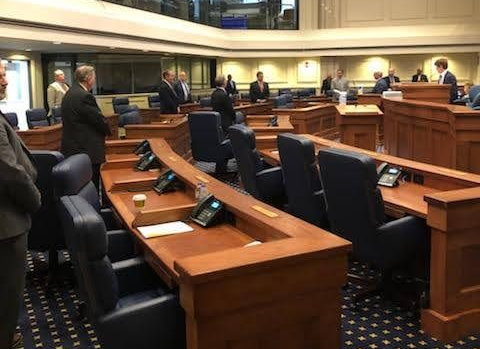
On Wednesday, the Alabama House of Representatives voted to pass Senate legislation requiring that the Alabama Ethics Commission share evidence uncovered that would exonerate persons accused of wrongdoing. Senate Bill 103 is sponsored by State Sen. Arthur Orr (R-Decatur). It is carried in the House by State Representative Cynthia Almond (R-Tuscaloosa). Rep. Almond explained, “What the bill does is require the ethics commission to turn over exculpatory information once the matter has gone through the investigative phase.” Almond asked that the House adopt a substitute version of the bill. The substitute adds the following passage, “If the commission or its employees disclose information to the respondent that the commission or employees believe is exculpatory, neither the commission nor its employees are liable for violating the restrictions relating to secrecy and nondisclosure of information provided in subsections (c) and (d) of Section 36-25-4, Code of Alabama 1975.” The House adopted the Almond substitute 102 to 0. This legislation is in response to an advisory opinion issued last year by the Alabama Ethics Commission stating that the Commission does not have to share any exonerating evidence with the attorneys of persons being investigated by the Commission. Alabama Attorney General Steve Marshall strongly objected to that position. He claimed that that position, which is counter to the rules of evidence in an Alabama courtroom, makes prosecuting any cases referred to the Attorney General’s office by the Commission problematic at best. The Attorney General’s office has sued the Ethics Commission to force the Commission to overturn the policy. Marshall has gone so far as to argue that any referral to prosecute someone from the Ethics Commission is “worthless” when it is highly possible that either in the trial or later when that conviction is appealed, it becomes known that there was exculpatory evidence already known to the Ethics Commission, but that evidence had been intentionally suppressed by the Ethics Commission or its staff. “Thus, the respondent can neither be confident that he fully understands the case against him, nor that the exculpatory evidence has been considered by the Ethics Commission before it votes on whether to refer the matter for prosecution or administrative resolution,” the lawsuit states. “In either case, the respondent’s legal defense is impeded.” According to the synopsis. “This bill would require the State Ethics Commission, before referring a case for prosecution of an alleged ethics or campaign finance violation or before resolving a violation administratively, to provide the person who allegedly violated the law with exculpatory evidence in the possession of the commission.” Passage of SB103 would mean that the Ethics Commission would have to share any evidence that it finds indicating that the accused may have been innocent of whatever crimes they have been charged with the accused and their attorneys before the Commission issues its judgment as well as before it refers any cases to the attorney general’s office or a district attorney for criminal prosecution. The Commission’s counsel has argued in court filings that this would “have a chilling effect” on the work of the Commission. SB103 passed the House of Representatives by a vote of 102 to 0. That afternoon, it returned to the Alabama Senate to consider the House substitute. Sen. Orr asked that the Senate vote to nonconcur with the House version of the legislation. That motion passed the Senate 34 to 0. The legislation now goes to a conference committee for its consideration. If the conference committee of Almond, Orr, and two additional members from each House are able to work out a compromise version of the bill, that conference committee version will still have to be approved by both Houses of the Legislature. Thursday will be day 29 of the regular session. The Alabama Constitution limits the regular session to no more than thirty legislative days. To connect with the author of this story or to comment, email brandonmreporter@gmail.com.
Committee cuts proposal to exempt overtime pay from income tax

A legislative committee on Wednesday gutted a proposal to exempt Alabama workers’ overtime pay from state income taxes after concerns arose about the potential loss to the education budget. The state House of Representatives had unanimously approved the legislation that would exempt all overtime from the calculation of gross income for state income tax purposes. The Senate Finance and Taxation Education Committee amended the bill so only the first $2,000 of overtime pay would be exempted. The state income tax is 5%. Finance and Taxation Chairman Arthur Orr expressed concern about the budget impact since lawmakers are also eyeing other tax cuts. The original bill would have cost the state a projected $45 million annually, but that would drop to $21 million with the change, according to estimates from the Legislative Services Agency. “I want to move slowly,” Orr said. “We’ve made a lot of decisions when it comes to tax cuts and tax credits.” House Minority Leader Anthony Daniels, the sponsor of the legislation, said he did not support the change. Daniels had argued that exempting overtime pay would allow working people to keep more of their pay. He said it would also help businesses entice workers to overtime shifts. The exemption would end in three years unless extended by lawmakers. Republished with the permission of The Associated Press.
Alabama House to consider ambitious special-order calendar on Wednesday
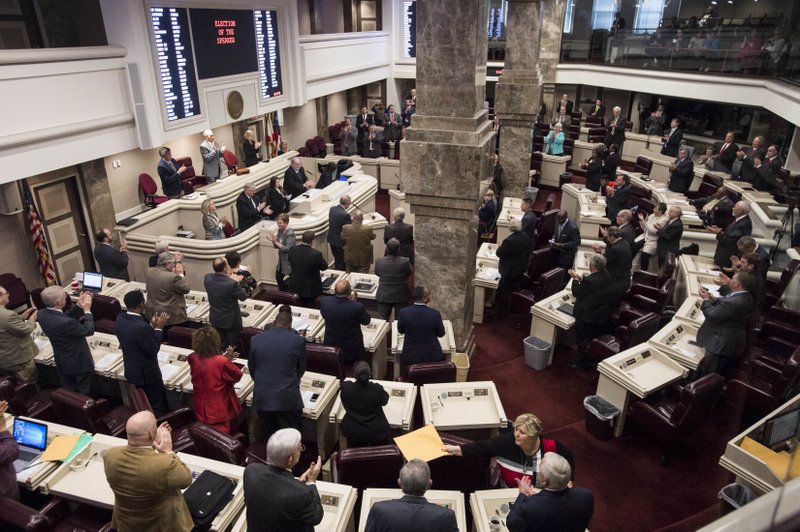
The Alabama House of Representatives will meet on Wednesday at 1:00 p.m. to consider a very ambitious proposed special-order calendar. Senate Bill 206 (SB206) is sponsored by State Senator Clyde Chambliss (R-Prattville). It is being carried on the floor by State Representative Allen Treadaway (R-Morris). SB206 creates the crime of organized retail theft and turns what used to be misdemeanor shoplifting into a felony. Senate Bill 261 (SB261) is sponsored by Sen. Dan Roberts (R-Mountain Brook). It is carried in the House by Rep. Chip Brown (R-Hollinger’s Island). The anti-ESG legislation would prohibit state and local governments from entering into certain contracts that boycott businesses in certain sectors or based on certain environmental or corporate governance criteria. Senate Bill 279 (SB279) is sponsored by Sen. Randy Price (R-Opelika) and carried in the House by Rep. Matt Woods (R-Jasper). SB279 deals with elected county superintendents of education. Under existing law, the salary for an elected county superintendent of education is required to be set by the county board of education before the beginning of the term of office. This bill would remove that requirement retroactive to July 1, 2021. Senate Bill 94 (SB94) is sponsored by Sen. April Weaver (R-Briarfield) and is carried in the House by Rep. Corley Ellis (R-Columbiana). SB94 would move the Shelby County juvenile probation services and probation officers into the state court system. Senate Bill 99 (SB99) is sponsored by Sen. Sam Givhan (R-Huntsville) and carried in the House by Rep. Prince Chestnut (D-Selma). SB99 would increase the mileage reimbursement rate received by jurors Senate Bill 56 (SB56) is sponsored by Sen. Arthur Orr (R-Decatur) and carried in the House by Rep. Allen Baker (R-Brewton). SB56 would require the use of video cameras in certain special education classrooms. Allen is bringing a substitute version of the bill. Senate Bill 292 (SB292) is sponsored by Sen. Roberts and carried by Rep. Joe Lovvorn (R-Auburn). SB292 would provide for the Department of Revenue to grant certificates of exemption from sales and use taxes to contractors and subcontractors licensed by the State Licensing Board for General Contractors for the purchase of building materials and construction materials to be used in the construction of a project for an entity that is exempt by law from paying sales and use taxes. Senate Bill 223 (SB223) is sponsored by Sen. Vivian Figures (D-Mobile) and carried in the House by Rep. Matt Simpson (R-Daphne) would include a child witness in the definition of “a physical offense, sexual offense, or violent offense” for the purpose of the Child Physical and Sexual Abuse Victim Protection Act. Senate Bill 309 (SB309) is sponsored by Sen. Chambliss and carried by Rep. Wood in the House. SB309 is related to contracts for professional services to provide for the procurement of certain professional service contracts based on competitive, qualification-based policies and procedures, as well as to provide for the advertisement of such contracts; and to subject such contracts to a fee schedule established by the Division of Construction Management of the Department of Finance. Senate Bill 198 (SB198) is sponsored by Sen. Orr and carried in the House by Rep. Cynthia Almond (R-Tuscaloosa). It would add additional offenses that would be subject to the presumptive sentencing guidelines; to modify the criminal penalties for criminal solicitation, attempt, and criminal conspiracy; to give a judge discretion when sentencing a person convicted of a Class C or Class D felony offense. Senate Bill 184 (SB184) is sponsored by Sen. Greg Albritton (R-Atmore) and carried in the House by Rep. Kyle South (R-Fayette). SB184 would authorize the Department of Corrections to expend funds for the recruitment and training of law enforcement officers and to further the mission of the department. South will introduce a substitute version of the bill. Senate Bill 224 (SB224) is sponsored by Sen. Figures and carried in the House by Rep. Simpson. It provides for the age of a child for the crime of transmitting obscene material to a child by computer, to establish jurisdiction for a violation of distributing a private image, and further provides for the crime of incest. Senate Bill 281 (SB281) is sponsored by Sen. Albritton and carried by Rep. Margie Wilcox (R-Mobile). SB281 creates a new distinctive license plate to benefit the USS Alabama Battleship Commission. Senate Bill 285 (SB285) is sponsored by Sen. Jones and carried in the House by Rep. Terri Collins (R-Decatur).SB285 will allow nonprofit organizations to host wine festivals. Senate Bill 176 (SB176) is sponsored by Sen Orr and carried by Rep. Collins. SB176 is the Student Right to Know Act of 2023. It requires the Alabama Commission on Higher Education to collect and make available online data for students to plan for their educational and professional futures; and for the Workforce Division of the Department of Commerce to share data and information with ACHE. Senate Bill 192 (SB192) is sponsored by Sen. Albritton and is carried in the House by Rep. Donna Givens (R-Loxley). SB192 would allow private corporations to limit access to industrial facilities and that industrial access roads to continue to be maintained as a public corporation. Senate Bill 263 (SB263) is sponsored by Sen. Donnie Chesteen (R-Dothan) and carried in the House by Rep. Terri Collins (R-Decatur). SB263 makes changes to the Alabama Accountability Act of 2013. It revises the law to change the term failing school to priority school and nonfailing to qualifying school to make other changes. Senate Bill 258 (SB258) is sponsored by Sen. Andrew Jones (R-Centre). It deals with nonprofit corporations that provide water services to the public authorizing a one-time audit by the Department of Examiners of Public Accounts. There is a substitute version of this bill. Senate Bill 103 (SB103) is sponsored by Sen. Orr: and carried by Rep. Almond. It would require the Alabama Ethics Commission to provide exonerating evidence to persons accused of ethics wrongdoing. Almond will introduce a substitute. Senate Bill 76 (SB76) is sponsored by Sen. Will Barfoot (R-Pike Road). It is carried in the House by Rep. Lovvorn. SB76 establishes the Rural Logging Support Act, funding supporting rural economic Development. Wednesday will be Day 28 of the 2023 Alabama Regular Legislative Session. To connect with the author of this story or to comment, email brandonmreporter@gmail.com.
Alabama Legislature sends budgets to Gov. Kay Ivey

On Thursday, the Alabama Legislature voted to send budget appropriations bills totaling over $14.8 billion to the desk of Alabama Governor Kay Ivey. For those legislators who experienced the 2011 thru 2017 post-Great Recession budget battles, the change in dollar amounts and the tone of the budget discussions are remarkably different. Alabama has an arcane budgeting system where there is not one budget; but two – the education trust fund (ETF) and the state general fund (SGF). Education spending is in the ETF, while most non-education-related state agencies, the largest of these being Alabama Medicaid and the Alabama Department of Corrections (ADOC), are in the state general fund (SGF) budget. On Thursday, the Alabama House of Representatives passed the fiscal year 2024 education trust fund budget (ETF) of $8.8 billion. That is by far the largest in state history. The House also passed a supplemental appropriation to the F.Y. 2023 education budget of almost $2.8 billion. The biggest controversy in this whole budget debate has centered around that supplemental appropriation. A conference committee was tasked with resolving the differences between the two budgets. Both Houses voted to concur on the conference committee version of the budget late on Thursday night. The biggest difference between the Governor’s budget request, the Senate version of the education budget, and the House version is the size of the tax rebates. In her State of the State speech, Alabama Governor Kay Ivey promised Alabamians $400 checks. That would have cost $980 million, according to the Governor’s office, while the Legislature’s estimate was over $1 billion. The Senate slashed that to $105 per taxpayer. The House doubled that amount to $210 per tax filer and $420 per couple. The version that came out of conference committee around 9:30 p.m. on Thursday was reduced to $150 per tax filer and $300 per couple. Both Houses voted to concur with the conference committee version of the budget and the conference committee version of the education supplemental. Instead of funding the Governor’s tax rebates, the Legislature created a second reserve account of nearly half a billion dollars in case a future economic downturn means that future legislatures need to tap reserves. The education budget already had a fully funded rolling reserve fund that could be used to prevent proration of the education budget. This second reserve fund will give the Legislature more flexibility in responding to a slowdown in tax revenues. The Legislature also created a new grant program to fund K-12 capital projects administered by the office of the Lieutenant Governor. Sen. Arthur Orr explained that these projects will be targeted to the greatest needs statewide. Rep. Danny Garrett explained that the conference committee version of the supplemental ETF appropriation meant ~$157 million had to be reappropriated from the rebates. $75 million went to the new cash reserve, $75 million to the Lt. Governor’s grant program, and another $7 million funded various projects. Orr and Garrett are the education budget chairs for their respective houses. While all this was happening in the House of Representatives, the Alabama Senate passed its version of the general fund budget. The over $3 billion SGF is by far the largest in state history. There was also a supplemental appropriation for the SGF. A conference committee worked out the differences between the House and Senate versions of the SGF after ~11:00 p.m. on Thursday. Both Houses voted to concur with the conference committee version of the general fund. Interestingly the conference committee version of the SGF at $3,013,650,381 is several million dollars left than the version that passed out of the House and even the version that the Senate passed just hours earlier. It is still more than the Governor requested. Sen. Greg Albritton said that one of the biggest issues facing the state is the escalating costs of construction. Inflation has hit the whole economy, but nowhere more than in construction costs, and the state has several construction projects underway in both the ETF and SGF, most notably the two mega prisons being built in Elmore and Escambia Counties. One area that is not discussed in all of these budget discussions is roads and bridges. This is because the Alabama Department of Transportation (ALDOT) receives its funds not from the ETF or SGF but from the road and bridge fund that comes from fuel taxes. This allows ALDOT to avoid proration in an economic downturn like what was experienced by schools and other state agencies a decade ago, but it also means that ALDOT misses out on windfalls from boom times like what we are experiencing now. If Alabama had a one combined pot of money budget, like most state governments, it is very easy to envision a scenario where the Legislature could have appropriated a billion dollars or more to ALDOT. This would have allowed the agency to draw down another $2 billion in federal funds to address long-term infrastructure needs such as the I-10 bridge over the Mobile River, six-laning I-65, or completing the Northern Beltway in Jefferson County. This is not an option in the unique budgeting system in the state of Alabama. The budgets now go to Governor Ivey for her consideration. The Legislature will return on Wednesday for day 27 of the 2023 Alabama Regular Legislative Session. The session is limited to just thirty legislative days by the Alabama Constitution. To connect with the author of this story or to comment, email brandonmreporter@gmail.com.
Governor will host a ceremonial bill signing for legislation passed during 2023 Regular Session
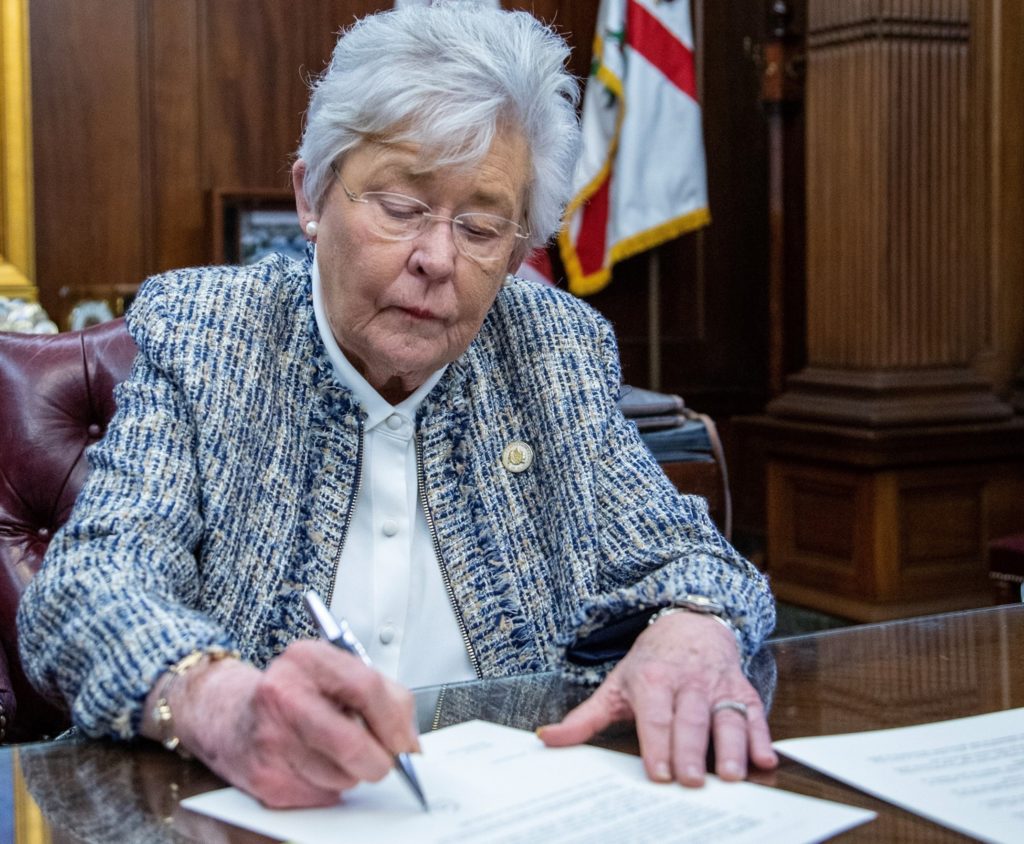
On Tuesday, Alabama Governor Kay Ivey will host a series of bill-signing ceremonies to celebrate the passage of several pieces of legislation that addressed concerns facing the state of Alabama. Ivey will sign several bills, including reform of the state’s adoption laws. House Bill 101 (HB 101) is sponsored by State Representative Ginny Shaver and State Senator Arthur Orr. This bill streamlines the state’s adoption process and updates the current adoption law language. (Act 2023-092). “Alabama has consistently set state records for adoptions and placed thousands of children in loving, forever homes,” said Gov. Ivey. “Currently, we have more than 5,000 children in the foster care system, and with this modernized and streamlined process now in place, we have positioned Alabama on even firmer footing and will be able to provide more of our children with the life they deserve.” House Bill 66 (HB66) by Rep. Joe Lovvorn and Sen. Andrew Jones allows certain firefighters, law enforcement officers, and correctional officers, covered under the ERS or TRS, to purchase hazardous duty time for prior service. (Act 2023-101). HB66 removes the time limitations for Tier I firefighters, law enforcement officers, and correctional officers covered under the Employees’ Retirement System or the Teachers’ Retirement System to purchase eligible service credit prior to January 1, 2003. House Bill 164 (HB164) by Rep. Andy Whitt and Sen. Jay Hovey requires high school students to complete a personal financial literacy and money management course before graduation. (Act 2023-179). “I have got story after story from thirty years of banking experience of young people who did not have a checking account,” said Whitt. “They go to convenience stores and check cashing places to get their paychecks cashed. One young fellow was working two hours a week just to be able to get his check cashed each week.” Senate Bill 131 (SB 131) by Sen. Vivian Figures and Rep. Steve Clouse. This bill transfers the regulation of preneed funeral contracts from the Department of Insurance to the Alabama Board of Funeral Services. (Act 2023-094). The Alabama Preneed Funeral and Cemetery Act of 2023 transfers the existing Preneed Funeral and Cemetery Act and the regulation of preneed contracts from the Commissioner and Department of Insurance to the Alabama Board of Funeral Service. It authorizes the Department of Insurance to temporarily transfer certain funds to the board to defray costs associated with the administration and operation of the Alabama Preneed Funeral and Cemetery Act of 2023; Senate Bill 28 (SB28) by Sen. Tim Melson and Rep. Randy Wood would expand the scope of practice of podiatry to include treatment of the foot and ankle. (Act 2023-106). Podiatrists in most states are already allowed to treat disorders of the ankle. This expansion of the scope of practice to come in line with national standards was long overdue. Senate Bill 104 (SB 104) by Sen. Chris Elliott and Rep. David Faulkner revises the current Dram Shop Act by addressing liability for providers of alcohol if a recipient injures a third party. (Act 2023-025) . Before this, only three insurance carriers would insure restaurants and bars from lawsuits due to the liability. This will make it harder for plaintiffs’ attorneys to prove a case against the establishment that sold the alcohol. House Bill 56 (HB56) by Rep. Frances Holk-Jones and Sen. Linda Coleman-Madison will expand the scope of practice for licensees of the Alabama Board of Social Work Examiners. (Act 2023-100). This will allow specially trained social workers with master’s degrees to diagnose mental illnesses. House Bill 62 (HB 62) by Rep. Ben Robbins and Sen. Keith Kelley will extend the amount of time that nonprofit veterans’ organizations have to comply with state and local building codes when acquiring a former armory building. (Act 2023-175). This bill primarily deals with an armory in Sylacauga owned by the American Legion and used by the Alabama National Guard. When the National Guard shut down its presence, it transferred back to the American Legion. The NG never updated the building during its tenure, so it lacks the sprinkler system needed to comply with state building code requirements. Tuesday will be day 24 of the 2023 Alabama Regular Legislative session. Kay Ivey has been governor since 2017. To connect with the author of this story or to comment, email brandonmreporter@gmail.com.
House Committee advances legislation providing stipends to principals who receive additional training
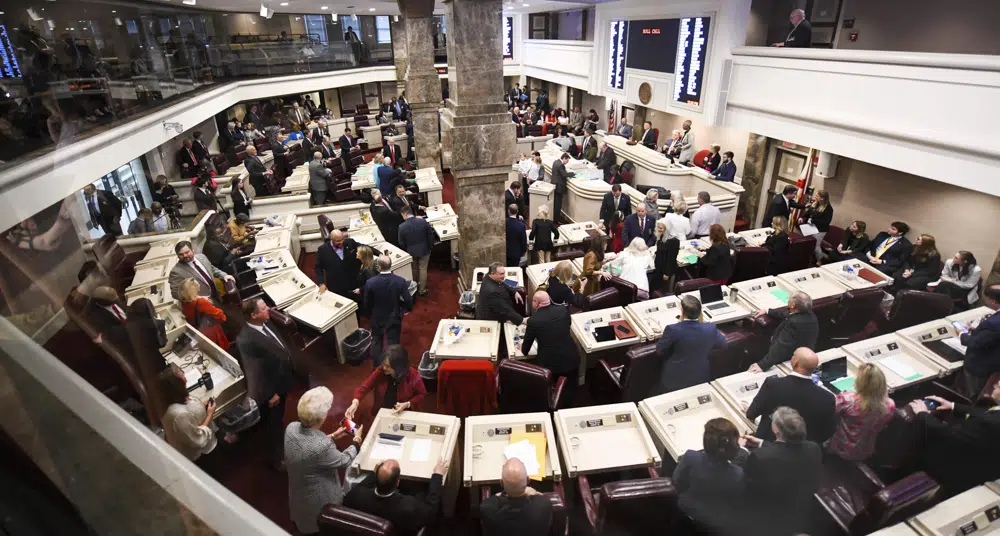
On Wednesday, the Alabama House of Representatives Ways and Means General Fund Committee advanced legislation that would provide up to $15,000 in additional stipends for principals who complete advanced leadership training. Senate Bill 300 (SB300) is sponsored by State Senator Arthur Orr. “This bill will be important for principals, compensating them and increasing the training for principals,” Orr explained. “There are extra stipends for hard-to-fill schools,” Orr said. “The principals are very much for it around the state.” The Senate adopted a substitute version of the bill. The substituted version of SB300 passed the Senate on Tuesday by a vote of 34 to 0. The legislation is being carried in the House by State Representative Alan Baker. Baker said this bill “creates the School Principal Leadership and Mentoring Act.” The synopsis states, “Existing law requires principals and assistant principals to complete five professional learning units every five years specific to serving in those administrative positions beyond the initial instructional leadership certification provided by state institutions of higher education. This bill would create the School Principal Leadership and Mentoring Act. This bill would require the creation and implementation of the Alabama Principal Leadership Development System and would require all principals and assistant principals to attend and satisfactorily complete the program.” Baker said that the bill provides a $10,000 stipend for principals that complete the program plus $5000 for those “serving in low-performing or high-poverty schools.” Rep Terri Collins said, “One of the biggest issues we have is discipline. I think this could really make a difference in student performance.” “I am pleased with all of the things I see in this,” Collins said. Rep. Debbie Wood asked, “Where did the $850,000 appropriation come from?” Baker said, “This rolls out in phases.” A clerk answered, “That is based on the figure that is in the ETF budget.” Committee Chairman Danny Garrett said, “Principals are so key and critical in good schools.” Garrett said, “My son, who is a teacher, told me, ‘I think anyone who is a principal for five years needs to go back to a classroom, and everyone who wants to be a principal needs to shadow a principal first.’” Baker said, “Professional development at the K-3 level would show them (principals) what proper teaching is in regard to the Literacy Act and the Numeracy Act.” The bill also appoints a 21-member design team and states a professional leadership academy. The legislation could be considered by the full House as early as Thursday. Thursday will be day 22 of the 2023 Alabama Regular Legislative Session. The legislature is limited to thirty legislative days in the regular session. To connect with the author of this story or to comment, email brandonmreporter@gmail.com.
Senate rejects due process for student discipline bill
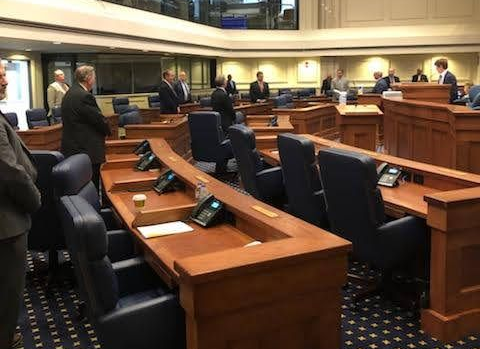
On Tuesday, the Alabama Senate voted to reject controversial legislation that would have set up a formal due process standard for disciplining a child in an Alabama public school. Senate Bill 181 (SB181) is sponsored by State Senator Rodger Smitherman. The synopsis states, “This bill would provide a uniform statewide system of procedural due process protections relating to the suspension and expulsion of public school students for violating the student code of conduct or state law. This bill would also provide for the adoption of any necessary rules to implement this act by the State Board of Education.” The bill, after being amended, was voted down rapidly with no floor debate. Smitherman then took an hour of time during the next bill to voice his unhappiness with the Senate’s rejection of his legislation. “Last year, we passed the same bill out of the Senate almost unanimous,” Smitherman said. Last year the legislation failed in the House of Representatives. The legislation was staunchly opposed by Alabama School Superintendents and other education supporters. “It is obvious they did a good lobbying effort among our colleagues to kill the bill,” Smitherman said. “The school superintendents, they have elevated their power now to the point that they can convince all but eleven people that these children do not need due process.” “Those little children ain’t going to have anybody standing out there (in the Statehouse halls) talking for them,” Smitherman said. “Who is getting suspended? Who is getting so many days? and for what reason?” Smitherman said heavily, implying that school systems target Black students, particularly males, for discipline. “The teacher is the judge, jury, and executioner,” Smitherman said. “They (the accused children) don’t get the first benefit of the doubt,” Smitherman said. “They are guilty until they are proved innocent.” The most controversial element of Smitherman’s legislation was giving a student the right to face their accuser. The Greene County Superintendent testified before committee that students fear retaliation by other students, so a student who might tell a teacher that another child has a gun in school; would not come forward if her identity was revealed. Smitherman also opposes the mandatory kindergarten bill that would force a child who did not attend kindergarten as a five-year-old to be denied admission into first grade. He also opposes the Alabama Literacy Act provision that a child that can’t read at grade level by the end of the third grade will have to repeat third grade. “First, they want to hold them back in the first grade,” Smitherman said. “If they don’t get them there, then they want to hold them back in third grade. If they don’t get them there, then they use these discipline policies to suspend or expel them.” “They ain’t going to stay in school when they are 21,” Smitherman said. “If they don’t get an education, they ain’t gonna get a job. If they have no job, they can’t eat.” Smitherman called the schools a “pipeline to prison.” The Legislature is also concerned with criminal gangs operating within many Alabama schools. The Senate voted down SB181 11 to 20. Jabo Waggoner, Tom Butler, Arthur Orr, and Greg Reed were the only Republicans to vote for the bill. Billy Beasley was the only Democrat who voted against the legislation. The controversial legislation appears to be dead for this session. To connect with the author of this story or to comment, email brandonmreporter@gmail.com.


